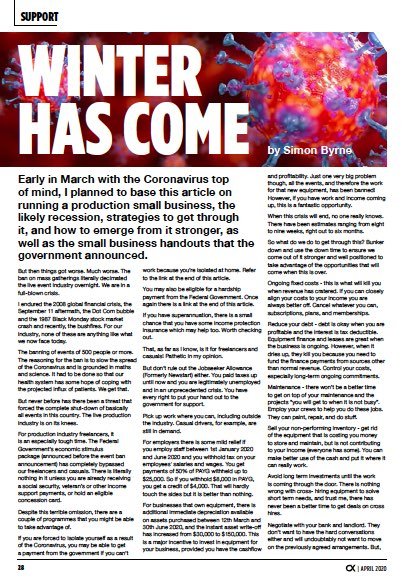News
7 Apr 2020
Winter Has Come

Subscribe to CX E-News
Early in March with the Coronavirus top of mind, I planned to base this article on running a production small business, the likely recession, strategies to get through it, and how to emerge from it stronger, as well as the small business handouts that the government announced.*
But then things got worse. Much worse. The ban on mass gatherings literally decimated the live event industry overnight. We are in a full-blown crisis.
* This is a quickly evolving space so it is advisable to check the links in this article and elsewhere for the latest information from both government and our industry.
I endured the 2008 global financial crisis, the September 11 aftermath, the Dot Com bubble and the 1987 Black Monday stock market crash and recently, the bushfires.
For our industry, none of these are anything like what we now face today.
The banning of events of 500 people or more. The reasoning for the ban is to slow the spread of the Coronavirus and is grounded in maths and science.
It had to be done so that our health system has some hope of coping with the projected influx of patients. We get that. But never before has there been a threat that forced the complete shut-down of basically all events in this country.
The live production industry is on its knees. For production industry freelancers, it is an especially tough time.
The Federal Government’s economic stimulus package (announced before the event ban announcement) has completely bypassed our freelancers and casuals.
There is literally nothing in it unless you are already receiving a social security, veteran’s or other income support payments, or hold an eligible concession card.
Despite this terrible omission, there are a couple of programmes that you might be able to take advantage of.
If you are forced to isolate yourself as a result of the Coronavirus, you may be able to get a payment from the government if you can’t work because you’re isolated at home. Refer to the link at the end of this article.
You may also be eligible for a hardship payment from the Federal Government. Once again there is a link at the end of this article.
If you have superannuation, there is a small chance that you have some income protection insurance which may help too. Worth checking out.
That, as far as I know, is it for freelancers and casuals! Pathetic in my opinion.
But don’t rule out the Jobseeker Allowance (Formerly Newstart) either. You paid taxes up until now and you are legitimately unemployed and in an unprecedented crisis.
You have every right to put your hand out to the government for support.
Pick up work where you can, including outside the industry. Casual drivers, for example, are still in demand.
For employers there is some mild relief if you employ staff between 1st January 2020 and June 2020 and you withhold tax on your employees’ salaries and wages.
You get payments of 50% of PAYG withheld up to $25,000. So if you withhold $8,000 in PAYG, you get a credit of $4,000.
That will hardly touch the sides but it is better than nothing.
For businesses that own equipment, there is additional immediate depreciation available on assets purchased between 12th March and 30th June 2020, and the instant asset write-off has increased from $30,000 to $150,000.
This is a major incentive to invest in equipment for your business, provided you have the cashflow and profitability.
Just one very big problem though, all the events, and therefore the work for that new equipment, has been banned! However, if you have work and income coming up, this is a fantastic opportunity.
When this crisis will end, no one really knows. There have been estimates ranging from eight to nine weeks, right out to six months.
So what do we do to get through this?
Bunker down and use the down time to ensure we come out of it stronger and well positioned to take advantage of the opportunities that will come when this is over.
Ongoing fixed costs – this is what will kill you when revenue has cratered. If you can closely align your costs to your income you are always better off.
Cancel whatever you can, subscriptions, plans, and memberships. Reduce your debt – debt is okay when you are profitable and the interest is tax deductible.
Equipment finance and leases are great when the business is ongoing. However, when it dries up, they kill you because you need to fund the finance payments from sources other than normal revenue.
Control your costs, especially long-term ongoing commitments.
Maintenance – there won’t be a better time to get on top of your maintenance and the projects “you will get to when it is not busy”.
Employ your crews to help you do these jobs. They can paint, repair, and do stuff.
Sell your non-performing inventory – get rid of the equipment that is costing you money to store and maintain, but is not contributing to your income (everyone has some).
You can make better use of the cash and put it where it can really work. Avoid long term investments until the work is coming through the door.
There is nothing wrong with cross- hiring equipment to solve short term needs, and trust me, there has never been a better time to get deals on cross hires.
Negotiate with your bank and landlord. They don’t want to have the hard conversations either and will undoubtably not want to move on the previously agreed arrangements.
But, we are in unprecedented times and it is in their interest to keep your business alive too. They can’t extract money from you if you don’t have it, or a way to get it, so at the very least, ask for deferred terms.
This is especially important if you cannot pay your bills. It is far better to engage with your creditors early and keep them informed than to keep them in the dark.
Talking of rent, I’ve always considered it to be dead money because a space serves a purpose, but doesn’t actually contribute to your income.
Therefore I would rent premises to suit my needs, but nothing more. It is nice to have luxurious offices and plenty of space, but not if your first two gigs every month are to pay the rent before you make any money yourself.
Fix that sadly neglected website – it is the calling card for your business and it is the first place your new prospective clients will go to.
You have the time as a result of this forced break, a great time to make it something to be proud of.
Improve your skills – When the work returns, skilled operators will be in demand. You could improve your skills with such areas as wireless frequency management, specialist hardware knowledge, IP networking, lighting programming and so on.
Seek professional advice – I know cash is valuable, but spending a few hundred dollars with your accountant may give you strategies that you have not thought of, and save you a lot of money.
Your accountant will also know of all the government programmes that could assist you.
Cast off your problem clients – you know who they are. The really slow payers who weren’t paying that much anyway. You can no longer afford to keep funding them.
Be the business that pays its bills quickly. Suppliers, especially freelancers, really appreciate it and when the business recovers, they will be first there to support you.
Come to think of it, they’ll be there in the tough times too!
This is unprecedented. We all need to work together and be flexible with each other like never before.
Be accepting of less-than-ideal work offers. Any deal you do in this environment is a good deal.
Look after your people, friends and colleagues. You’ll learn who your real friends are, and this crisis will end.
Places and organisations for support
Jobseeker Payment (Formerly Newstart) https://www.servicesaustralia.gov.au/individuals/services/centrelink/jobseeker-payment
Commonwealth Coronavirus payment for casuals
https://www.servicesaustralia.gov.au/individuals/subjects/affected-coronavirus-covid-19/people-who-dont-get-payment-from-us-coronavirus-covid-19
Commonwealth Hardship Payment
https://www.servicesaustralia.gov.au/individuals/topics/asset-hardship-provisions/27496
Tech Checks on Facebook
https://www.facebook.com/groups/1179643328866204
A Facebook group started by Steve King is a place for everyone in the events industry to keep in check. Too many of us have been affected by loss of colleagues and mates due to depression and mental health issues. Tech checks is a place for us all to know that we of the industry have each other’s backs, even just for a short friendly word of support.
The Tech Sisters
https://www.facebook.com/groups/thetechsisters
A global community of Tech sisters, who are committed to working hard and supporting others, in their own pursuit for career and personal success, doing the journey together.
Crew Care
https://crewcare.org.au
CrewCare is all about supporting technical and backstage personnel and their loved ones working in the Australian live music scene.
Support Act
https://supportact.org.au
Support Act is Australia’s charity delivering crisis relief services to artists, crew and music workers as a result of ill health, injury, a mental health problem, or some other crisis that impacts on their ability to work in music.
Lifeline
https://www.lifeline.org.au or phone 131 114
24/7 Crisis support.
I lost my Gig
https://ilostmygig.net.au
Register your losses on this website so the industry has accurate figures to lobby the government with.
CX Magazine – April 2020
LIGHTING | AUDIO | VIDEO | STAGING | INTEGRATION

Entertainment technology news and issues for Australia and New Zealand
– in print and free online www.cxnetwork.com.au
© VCS Creative Publishing
Subscribe
Published monthly since 1991, our famous AV industry magazine is free for download or pay for print. Subscribers also receive CX News, our free weekly email with the latest industry news and jobs.






